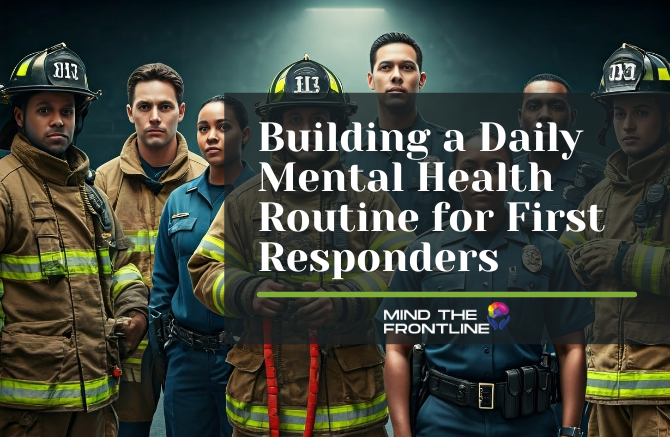Building a Daily Mental Health Routine for First Responders
First responders face unique mental health challenges due to the nature of their jobs. Building a daily mental health routine can be a powerful tool...
5 min read
 Chris Smetana, AS, FP-C, CCP-C, NRP | Founder/President
:
Apr 8, 2025
Chris Smetana, AS, FP-C, CCP-C, NRP | Founder/President
:
Apr 8, 2025
.png)
First responder families face unique challenges, making self-care essential for maintaining mental and emotional well-being. This blog explores effective strategies to promote self-care and resilience within these families.
First responder families face a myriad of unique challenges that can significantly impact their mental and emotional well-being. The high-stress nature of emergency medical services means that first responders often bring their work-related stress home, affecting the entire family unit. This stress can manifest in various ways, such as irritability, withdrawal, or difficulty in communicating, which can strain relationships and create a tense home environment. Long and unpredictable hours can lead to missed family events, such as birthdays, anniversaries, or school functions, fostering feelings of disappointment and a constant sense of uncertainty about the future. This unpredictability can make it difficult for family members to plan activities or maintain a routine, adding to the stress.
Moreover, the inherent risks and trauma associated with the job can create anxiety and emotional strain for both the first responder and their family members. Witnessing or hearing about traumatic events can lead to secondary traumatic stress, where family members experience symptoms similar to post-traumatic stress disorder (PTSD), such as nightmares, hyper-vigilance, or emotional numbness. This emotional burden can be compounded by the fear of potential harm coming to their loved one while on duty, leading to chronic anxiety and worry. Understanding these challenges is the first step towards building resilience and promoting a healthier family dynamic. By acknowledging the unique pressures faced by first responder families, they can begin to develop coping strategies and support systems that foster emotional strength and unity, ultimately enhancing their overall well-being.
.png?width=401&height=262&name=Blog%20Section%20Pictures%20(16).png)
Open communication is crucial for fostering resilience in first responder families, as it lays the foundation for a strong, supportive network that can withstand the pressures unique to their lifestyle. It's important for family members to feel comfortable discussing their feelings, concerns, and experiences without fear of judgment or reprisal. This level of openness not only helps in diffusing tension but also in building a nurturing environment where each member feels valued and heard. When family members are able to share their thoughts freely, it creates a sense of trust and mutual respect, which are essential components of a resilient family unit.
Regular family meetings or check-ins can provide a dedicated time to discuss any issues or stressors that may be affecting the family. These gatherings offer a structured opportunity for everyone to voice their concerns and work collaboratively towards solutions, ensuring that no one feels isolated or overwhelmed by their challenges. Encouraging children to express their feelings and thoughts is particularly important, as it helps them develop emotional intelligence and resilience from a young age. When children feel secure and understood, they are more likely to thrive and contribute positively to the family dynamic, further strengthening the family bond. By fostering an environment where open communication is the norm, first responder families can better navigate the complexities of their unique circumstances, ultimately enhancing their collective well-being.
.png?width=401&height=262&name=Blog%20Section%20Pictures%20(17).png)
Setting clear boundaries is essential for protecting family time and ensuring that work stress does not intrude on personal life. First responders, who often face intense and unpredictable work environments, should make a conscious effort to disconnect from work during off-hours to preserve their mental and emotional well-being. This disconnection can be achieved by setting specific times when work-related discussions are off-limits, allowing family members to focus on each other without the looming presence of job-related stress. Additionally, creating rituals that signal the transition from work to home life can be incredibly beneficial. These rituals might include changing out of work uniforms immediately upon returning home, engaging in a brief meditation session, or even taking a short walk to clear the mind and reset before fully engaging with family activities.
Planning regular family activities and prioritizing family time can also help in maintaining a healthy balance between work and personal life. These activities, whether they are simple dinners together, weekend outings, or game nights, serve as an opportunity for family members to reconnect and enjoy each other's company. Such interactions are crucial for reinforcing the family unit's resilience, as they provide a space for laughter, shared experiences, and the strengthening of emotional bonds. By dedicating time to these activities, families can create cherished memories and a sense of stability, which are vital in counteracting the stress and unpredictability that often accompany the life of a first responder.
.png?width=401&height=262&name=Blog%20Section%20Pictures%20(18).png)
Self-care is not just an individual responsibility but a collective one, especially in first responder families, where the demands of the job can often spill over into personal life, affecting everyone in the household. Engaging in self-care practices together can help in promoting overall well-being and fostering a sense of unity and support. By participating in activities such as family exercise routines, mindfulness practices, or even simple recreational activities like playing board games or going for nature walks, families can create shared experiences that serve as effective stress-relievers. These activities not only provide a break from the daily pressures but also strengthen family bonds, creating a supportive network that can help each member feel more connected and understood.
Encouraging each family member to take time for themselves is also important, as it allows individuals to recharge and maintain their personal well-being. This could mean different things for different people—whether it's pursuing a hobby like painting or gardening, engaging in a sport such as cycling or swimming, or simply enjoying some quiet time alone with a good book or music. Supporting each other's self-care routines can create a nurturing environment conducive to mental and emotional well-being, where everyone feels valued and respected. By recognizing and respecting each person's need for personal time, families can cultivate an atmosphere of empathy and understanding, which is crucial for maintaining harmony and resilience in the face of the unique challenges they encounter.
.png?width=401&height=262&name=Blog%20Section%20Pictures%20(19).png)
There are times when professional support becomes absolutely essential to effectively navigate the myriad of unique challenges faced by first responder families. The demanding nature of their roles often means that the stress and trauma experienced by first responders can spill over into their personal lives, affecting not only themselves but also their loved ones. In such situations, seeking help from mental health professionals, such as therapists or counselors who specialize in trauma and stress, can be incredibly beneficial. These professionals are equipped with the expertise to provide valuable coping strategies and emotional support tailored specifically to the needs of first responder families. They can offer guidance on managing stress, improving communication, and developing resilience, which are crucial for maintaining a healthy family dynamic.
Moreover, many organizations recognize the unique pressures faced by these families and offer support groups specifically designed for them. These groups provide a safe and understanding community where individuals can share their experiences and challenges with others who truly understand what they are going through. Being part of such a community can offer mutual support, reduce feelings of isolation, and foster a sense of belonging. Accessing these resources can make a significant difference in maintaining mental and emotional resilience, as they provide a network of support that can help families navigate the complexities of their lives with greater ease and confidence. By reaching out for professional support and engaging with these specialized resources, first responder families can build a stronger foundation for their mental and emotional well-being, ensuring they are better equipped to handle the demands of their unique lifestyle.
.png?width=401&height=262&name=Blog%20Section%20Pictures%20(20).png)
Don't Suffer Alone!
Get your copy of Back in Service: Frontline Stories of Resilience. This collection includes stories from frontline workers and their families from across the country with each author sharing a unique story about how their career has impacted them and details on how they have grown into a rejuvenated lifestyle of resilience.

Explore many valuable First Responder Mental Health and Wellness resources on Mind the Frontline's online platform. Discover the link below to access a wide range of support and information tailored specifically for first responders.
Additional Mind the Frontline Resource's
Stay connected with Mind the Frontline on Facebook & LinkedIn.
$BI-TAPP $50 DISCOUNT OFF CODE:frontline40
Transform Peer Support in Your Agency with Mind Shield LMS
At Mind the Frontline, we’re proud to introduce Mind Shield LMS, a game-changing platform designed to empower first responder peer support programs.
Key Features:
✅ Automated Educational & Motivational Emails
✅ Streamlined Follow-Up Task Creation
✅ Comprehensive Resource Library
✅ Customizable Dashboard
Why Mind Shield LMS?
✨ Boost efficiency: Automate routine tasks and focus on meaningful support.
✨ Ensure no one is left behind: Every request is tracked and addressed.
✨ Equip your team: Provide tools and resources for effective peer support.
💻 Start Today! Request a free 30-day trial and see the impact firsthand.
📩 Get Started Now: Request More Information
Join us in prioritizing the mental health and wellness of first responders. Together, we can build stronger, more resilient teams.

First responders face unique mental health challenges due to the nature of their jobs. Building a daily mental health routine can be a powerful tool...
-3.png)
Unlock the secrets to holistic well-being by mastering the four pillars of self-care, crucial for first responders and veterans.
-2.png)
Inner child healing offers transformative benefits for first responders and veterans, helping them navigate the emotional scars of their demanding...